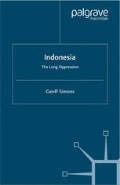Abstract
The Sukarno revolution, like all revolutions, included three crucial phases: the period of struggle against an existing government; the taking of power; and the subsequent attempt to reshape society under the aegis of a new regime. This tidy delineation necessarily disguises many conflicting trends, cross-themes and confusions. Foreign powers often have an interest in muddying the revolutionary waters or even in restoring the old regime; there are inevitable tensions between the role of the revolution-maker and the revolution-consolidator — and between the various leaders of the revolutionary movement. In such circumstances it is quite impossible, despite the urgings of the political purists, to divorce the course of the revolution from the individual personalities of its leaders, or from the prevailing ideological climate. The Indonesian revolution was shaped by many factors, including the character of Achmed Sukarno, the character of Indonesia’s political culture, and the ubiquitous pressures of the Cold War.
Access this chapter
Tax calculation will be finalised at checkout
Purchases are for personal use only
Preview
Unable to display preview. Download preview PDF.
Notes
Quoted in Bruce Grant, Indonesia (Harmondsworth, England: Penguin Books, 1967), pp. 29–30.
Memorandum sent by Indonesian officials of the Netherlands Indies Civil Administration (NICA) to the Dutch government, transmitted through Dr van Mook, published by Perhimpoenan Indonesia (London office); quoted in Dorothy Woodman, The Republic of Indonesia (London: Cresset Press, 1955), pp. 215–16.
D. F. Fleming, The Cold War and Its Origins, 1917–1960, volume 2: 1950— 1960 (London: George Allen and Unwin, 1961), pp. 662–3.
Details of the Republic’s armed forces are given in Harold Crouch, ‘Indonesia’, in Zakaria Haji Ahmad and Harold Crouch (eds), Military-Civilian Relations in South-EastAsia (New York: Oxford University Press, 1985), pp. 51–3.
Robert Payne, ‘The Challenge of Asia’, Pacific Affairs, March 1948, p. 55.
Arthur Clegg, Hands Off Indonesia (London: Communist Party, 6 January 1946).
J. Foster Collins, ‘The United Nations and Indonesia’, International Conciliation, March 1950, p. 151.
Richard Nixon, Memoirs (London: Arrow Books, 1978), p. 121.
H. Freigth, The Decline of Constitutional Democracy in Indonesia (Ithaca: Cornell University Press, 1962).
M. C. Ricklefs, A History of Modern Indonesia since c. 1300 (London: Macmillan, 1991), p. 243.
Quoted in Louis Fischer, The Story of Indonesia (New York: Harper and Bros, 1959), pp. 177–80.
Dennis Bloodworth, An Eye for the Dragon: South-East Asia Observed, 1954–1970, (London: Secker and Warburg, 1970), p. 108.
D. R. SarDesai, Southeast Asia: Past and Present (London: Macmillan, 1989), pp. 236–8.
Rex Mortimer, ‘Class, social cleavage and Indonesian Communism’, Indonesia, No. 8 (October 1969), p. 18.
Harold Crouch, The Army and Politics in Indonesia (Ithaca: Cornell University Press, 1988), p. 40 (note).
Elsewhere I have given many examples of this modern American philosophy. See, for example, Geoff Simons, Vietnam Syndrome (Macmillan, 1998); The Scourging of Iraq, 2nd edition (Macmillan, 1998); Cuba: From Conquistador to Castro (Macmillan, 1996).
Joseph Burkholder Smith, Portrait of a Cold Warrior (New York, 1976), p. 205.
Ibid., p. 242; Thomas Powers, The Man Who Kept Secrets: Richard Helms and the CIA (New York: Knopf, 1979), p. 90.
Audrey R. Kahin and George McT. Kahin, Subversion as Foreign Policy: The Secret Eisenhower and Dulles Debacle in Indonesia (New York: The New Press, 1995), p. 29.
John Foster Dulles, quoted in New York Times, 2 April 1958;
Christopher Robbins, Air America (London: Corgi Books, 1988), p. 85.
Achmed Sukarno, Autobiography, told to Cindy Adams (New York, 1965), p. 268.
Robert B. Mahoney Jr, US Responses to International Incidents and Crises, 1955–1975, volume 2: Summaries of Incidents and Responses (Arlington, VA: Center for Naval Analysis, 1977), p. c-17.
Copyright information
© 2000 Geoff Simons
About this chapter
Cite this chapter
Simons, G. (2000). The Sukarno Revolution. In: Indonesia: The Long Oppression. Palgrave Macmillan, London. https://doi.org/10.1057/9780333982846_4
Download citation
DOI: https://doi.org/10.1057/9780333982846_4
Publisher Name: Palgrave Macmillan, London
Print ISBN: 978-1-349-41486-4
Online ISBN: 978-0-333-98284-6
eBook Packages: Palgrave Political & Intern. Studies CollectionPolitical Science and International Studies (R0)

